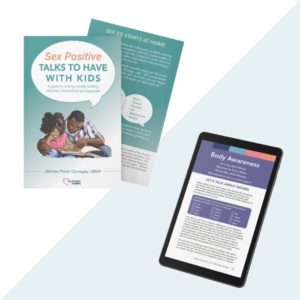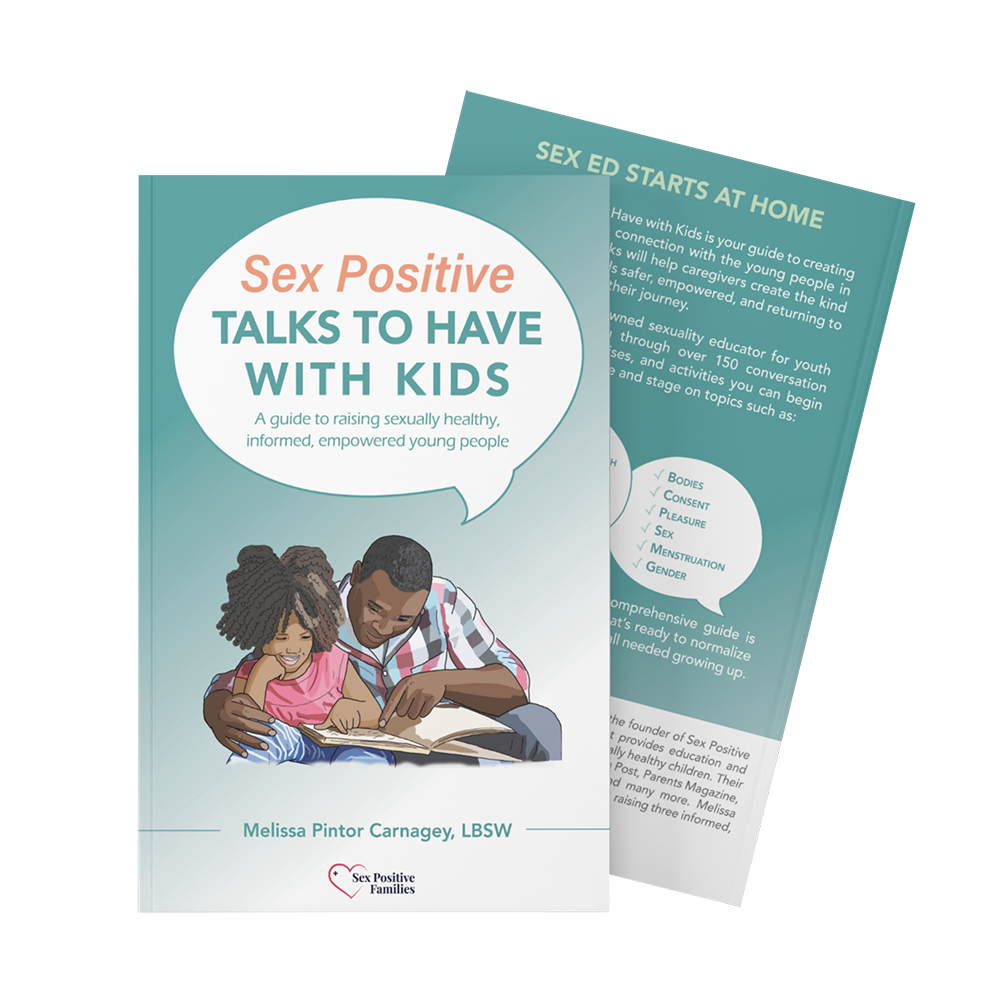-by: Melissa Pintor Carnagey, LBSW-
“Is it okay for my kids to see me naked?”
It’s a very common question we receive from caring adults who want to raise children in a sex positive environment but who may be unclear where “the line” on this one is.
The truth is, adults sexualize nudity before a child ever does because bodies are not inherently erotic or sexual.
To a child, particularly before puberty and hormonal changes occur, people’s bodies simply have parts and functions. Any sense of inhibition or embarrassment they may begin to demonstrate over their own bodies or the bodies of others is very much influenced by the messages they pick up on from the caring adults and the world around them.
If a parent, while changing, hurries to cover their breasts or genitals around a child or if a parent prefers to relax at home in the nude, both behaviors send a message about that parent’s values and can influence what the child interprets in their developing understanding about bodies.
So, to the question of whether it is okay for kids to see parents or caregivers naked- the answer is that bodies in their bare, natural form are not damaging for a child to see.
If the nude person does not consent to their body being seen or if they’re being coerced, then that is not okay. If the child has expressed a discomfort or boundary related to seeing another person’s naked body, and they are being forced or coerced to anyway, then that is not okay. But, if there is a home or community culture where bodies in their nude form is a way of life, with attention to consent, then it’s perfectly okay.
What are some things parents can consider when deciding how nudity will be handled in the home?
- use accurate, non-shaming terms for bodies, parts, and functions
- talk openly about societal norms and expectations regarding nudity. For example, explore together examples of when, where, and for whom it can be acceptable for bodies to be naked or for certain parts to be bare, and when is it considered not acceptable. Make it clear to them that what’s done in one home may not be true for another, and that’s okay.
- know that it is a healthy aspect of children’s development to be curious about bodies, especially when they’re getting the message that some parts are hidden, making it even more intriguing. The fact that they’ve openly shown their curiosity with you, demonstrates they view you as a trusted adult in their world. Their interest becomes an opportunity for a teachable moment.
- talk about privacy, safe and unsafe touch, features of a trusted adult, and under what circumstances a trusted adult may see parts of their body not covered by clothes (ex. medical appointments).
- respect the privacy preferences of adults and children in the home. What may be comfortable to one, may not be to another, and that’s okay. Particularly for adult survivor’s of sexual trauma, this subject can feel triggering, so be sure to work together compassionately to find common ground and agreements you all can feel supported within.
- check-in periodically, as a family, about each members’ comforts specific to nudity. What might have felt fine to a child when they were 5, may not feel comfortable to them when they’re experiencing body changes within puberty. So keep the topic an open, safe dialogue, and know that it can be common for individual comforts to change at any time. Those evolving feelings and boundaries should always be respected.
Be in the habit of asking yourself- what messages do I want my children to understand about their bodies, others’ bodies, and how to navigate the world around them? What am I doing now to support these messages? What may I be doing to hinder these messages?
A family’s sex positivity isn’t measured by how naked they desire to be, but by how willing they are to maintain an open, respectful understanding of sexual health in shame-free ways, at every age and stage.
If you find that this is an area where you could use guidance, our resources page provides great opportunities to learn more. We also offer one-on-one coaching to support your family’s sexual health, so you’re better prepared, not scared, along the journey.
 For a guide made just for parents and caregivers to tackle sexual health talks at every age and stage, check out our bestselling book Sex Positive Talks to Have With Kids: A guide to raising sexually healthy, informed, empowered young people.
For a guide made just for parents and caregivers to tackle sexual health talks at every age and stage, check out our bestselling book Sex Positive Talks to Have With Kids: A guide to raising sexually healthy, informed, empowered young people.

Sex Positive Talks to Have With Kids is the bestselling guide to creating an open, shame-free connection with the young people in your world.
It’s an inclusive, medically accurate, and comprehensive resource that walks you through over 150 conversation starters, reflection exercises, and activities you can begin implementing at every age and stage to normalize sexual health talks and become the trusted adult we all needed growing up.
